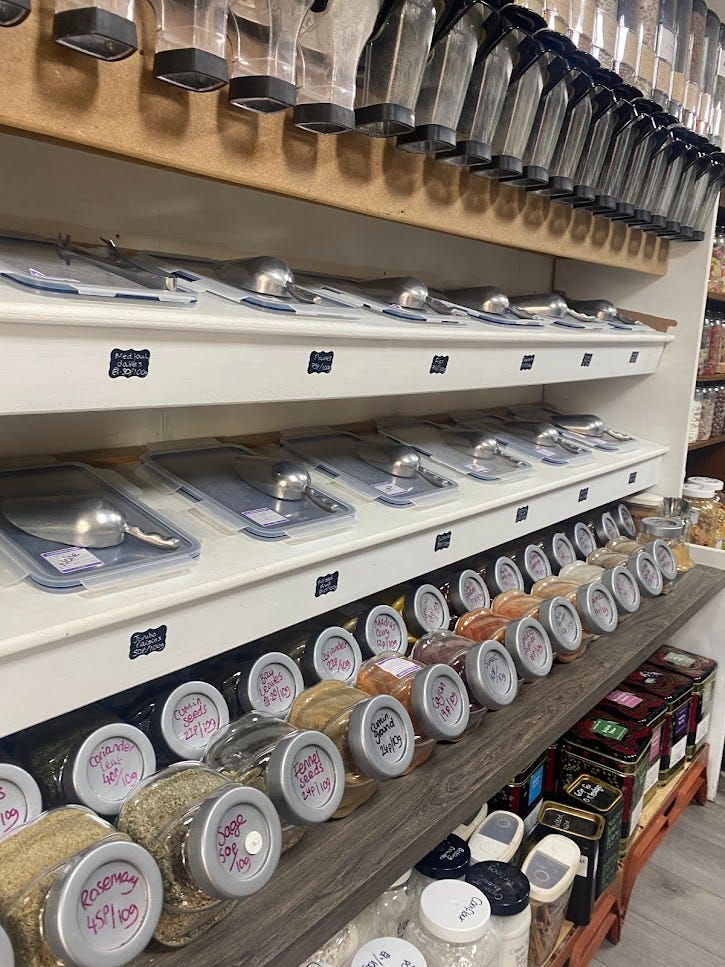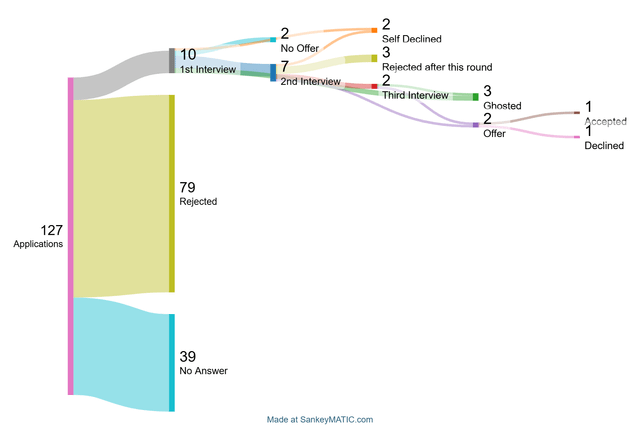Hello!
Thank you for joining me, I’m so glad you’re here.
After the recent news of the supermarket layoffs despite good profits, I wanted to gently nudge you towards whatever local shops you may have in your area. Despite living in a very working class town, I am so lucky to be walking distance from a refill shop (that sells everything from frozen stuff to cleaning products, oils and sauces… all refillable! And much cheaper than the supermarket!) and a proper old fashioned green grocers.
Shopping local creates local jobs, and affects things like the ability for teens to get Saturday jobs as well as of course money staying in the local area rather than going to create shareholder value.
Please do check to see if you have local shops (especially refill shops which are so fun!) and join me in the indie shop revolution!
I’m not doing a voiceover for this week’s newsletter, firstly because it does take time (there’s no edit button so if I get it wrong, I have to start from the beginning again). But also because I have a feeling no one is listening… So just to be sure, I wanted to poll you if that’s OK. Don’t worry about hurting my feelings; I just want to make sure I’m not leaving anyone behind by not doing audio.
I had a pretty hard time this week. That’s not a reflection on my employer or anything - everyone has bad weeks, no matter where they work or what they do. Even when I was at Nintendo, playing video games most of the day as a translator, there were days that were less than ideal.
Offloading to an HR friend, both of us having experienced redundancies in the last year, we acknowledged that it feels so wrong to be complaining about a job without pointing out that we are so lucky to have one, while so many HR people are still searching.
The market seems to be shifting, and this week I spotted - maybe for the first time in ages - an HR career move announcement on LinkedIn that was through choice rather than necessity. But there are still lots of amazing people out there searching, so it feels immoral to be complaining about a job being less than perfect.
I’ve seen quite a few Reddit posts recently - as well as people asking me directly - about getting into HR. I always grimace in these situations because it’s hard to recommend a line of work that seems to be so challenging right now. With the scale of redundancies, the number of excellent people applying for jobs, the low salaries, and to top it off, a third of HR professionals apparently want to quit due to burnout [People Management] - how can I recommend more people coming into this line of work?
It’s easy to look at HR and see it as a “transferable skills” kind of career. Sure, many of us fell into this work through transferable skills. However in an employer-driven market, in a world where any job that can be offshored or digitised will do so, being good with people simply isn’t enough to get a job.
So what skills do we need?
The newly published WEF Skills Report shows that there will be more jobs created than those which will disappear by 2030:
And they go on to say that the skills with the biggest growth will be those relating to data - which is unsurprising I guess:
The jobs most in decline are mostly admin based roles:
Having recruited some data roles recently, even those are hard to fill despite the volume of applicants. The “everyone learn data FAST!” trend has meant that there are lots of people who have had careers in other things who - as I myself have - put themselves through a data bootcamp to upskill themselves.
While work from orgs like Girls Who Code (who I learned with) are getting great shout outs in parliament [Instagram] it’s causing a big influx of those at the bottom of the skills chain without enough real appetite to employ at that entry level. It’s also caused a somewhat toxic sub-market of data skills bootcamp providers, sometimes with “pay to play” requirements, and others with unfortunate terms [Financial Times] and conditions for those who study with them. Full disclosure, a previous employer of mine was one such company.
For someone who is sat in a job like admin, banking, perhaps even HR, that show up on these lists of jobs that will soon be obsolete, it’s hard to know what to do. There aren’t many jobs these days that will take someone fresh and give them a chance.
A very raw newsletter [Substack] from a young 20-something about her experience trying to get any job (which I found via
) gives insight into the frustration and anger of young people who have worked hard to get into a field, only to find that hard work and skill alone won’t cut it.This graph from a Reddit user shows a very typical journey for someone looking for work right now:
I’d even go to say that this is much better than an average journey so would imagine they are a skilled worker in something. For someone like our gen z friend from the previous link, this kind of ratio would be a dream. I put the graph here because I think it’s important for us in HR to see clearly what our candidates are going through. While a bulk rejection after a recruitment process may be simple for us, to the candidate we are one more rejection in the pile of 79 (and let’s not get started on the ones who ghosted - even after THREE interviews!)
Back to the skills challenge, with so many people desperately wanting work and organisations not having enough candidates with the right skills, the solution is of course for there to be more jobs created where people can learn and grow at any part of their career (that 1 in 6 apprentices have a degree [FE Weekly] already shows us that the picture of an apprentice being a school leaver is not always the truth, and that people later in their careers also want to learn new skills).
But the pushback is always that such entry level roles can have no expectation of value added from the employee until they’ve built up a meaningful amount of experience in the role - they are an investment, a hope that the newly skilled employee will stay loyal to this company who gave them a chance. With gen z in particular frequently reported as not lasting more than 18 months in a role, an organisation will want to see better return on investment for creating these learning opportunities.
To finish with a recommendation for anyone wanting to explore learning, Helen Tupper of Squiggly Careers is really smashing out truly excellent LinkedIn content on the subject. Here’s the link to the below post, but I really recommend all her recent posts in this style:
Links
I’ve been enjoying Recruitonomics’ content recently. This post about how gen z are struggling to get a foot on the career ladder is a good follow on from the above - with lots of data.
This is an interesting (but quite American) site that uses AI (?) and matches career questions from students with correlating professionals. Might be good to sign up and help advising the next generation!
Is the ATS using AI to auto reject you??? Lee Harding asked recruiters if they use AI in this way, and almost 500 voted…with an answer most of us will know already.
But the anger about this is causing some candidates to be AWFUL to recruiters. I was in shock reading this email sent to Talent Lead Laura Wood.
I found this post asking for advice going into their first office job quite endearing. And there’s decent advice in there!
An interesting post from a hiring manager who, despite getting lots of applications, feels the overall quality to be bad and fuelled by AI. The comments assuming it’s poorly paid are interesting too.
I’m sure we can all relate to this…
That’s it for this week!
See you next time!
Charlotte










